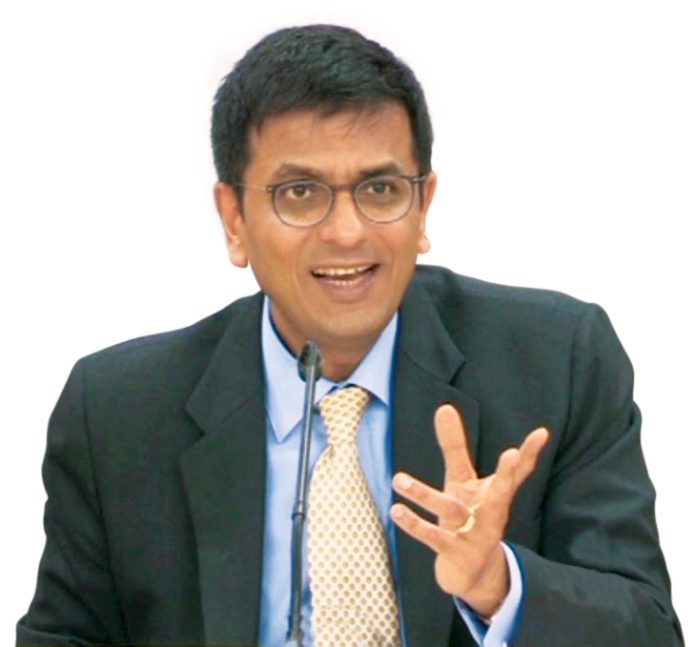Chief Justice of India-designate Dr Justice Dhananjaya Yeshwant Chandrachud has been part of many landmark verdicts, during his six-year tenure as a Supreme Court judge. With sound knowledge of law and the Constitution, he has given verdicts redefining the Indian judiciary. Some of the most remarkable verdicts by the CJI-designate are:
Permanent commission for women in armed forces
A Bench led by Dr Justice DY Chandrachud broke the glass ceiling by enabling women officers in the Indian Army to get permanent commission and command postings in February, 2020. The Apex Court rejected the Centre’s stance on their physical limitations, which was based on gender performance and other stereotypes that discriminated against women.
Another Bench headed by him later delivered a similar verdict for women in the Indian Navy, permitting them a permanent commission as well.
Right to Privacy as a fundamental right
On August 24, 2017, a nine-judge Constitution Bench, headed by Justice Chandrachud, unanimously held that the right to privacy should be guaranteed as a fundamental right under the Constitution. The order was passed on a writ petition filed by Justice KS Puttaswamy, a retired judge of the High Court, challenging the constitutional validity of the Aadhaar scheme introduced by the UPA Government.
Decriminalisation of Section 377 under the Indian Penal Code
On September 6, 2018, the five-Judge Bench led by then Chief Justice of India and also comprising Justice Rohinton Nariman, Justice DY Chandrachud, Justice AM Khanwilkar and Justice Indu Malhotra partially struck down Section 377 of the Indian Penal Code, decriminalising same-sex relations between consenting adults on the grounds that it discriminated against individuals on the basis of their sexual orientation and gender identity, thus violating Articles 14 and 15 of the Constitution.
The Apex Court, however, upheld the provisions in Section 377 that criminalised non-consensual acts or sexual acts performed on animals.
Granting abortion rights to unmarried women, transgenders
The Supreme Court bench headed by Justice Chandrachud extended the benefits of the Medical Termination of Pregnancy Act, 1971 (MTP Act) to unmarried women and transgenders on September 29 this year.
The verdict was delivered on the International Safe Abortion Day, with the Bench noting that the law should not decide the beneficiaries of a statute based on narrow patriarchal principles about what constitutes permissible sex as it would create invidious classifications.
Striking down Section 497 of the Indian Penal Code
A five-Judge Bench, comprising then Chief Justice Dipak Misra, Justice RF Nariman, Justice AM Khanwilkar, Justice D.Y. Chandrachud and Justice Indu Malhotra termed Section 497 of the Indian Penal Code (IPC) as unconstitutional on the grounds that it was parochial, arbitrary and violated the right to equality and privacy.
Entry of women in Sabarimala temple
A five-judge Constitution Bench of then CJI Ranjan Gogoi, Justice Rohinton Nariman, Justice AM Khanwilkar, Justice DY Chandrachud and Justice Indu Malhotra permitted women of menstruating age to enter Sabarimala temple in September 2018, observing that all Hindu pilgrims, regardless of gender, were permitted to enter the temple.
Any exception placed on women because of biological differences violated the Right to Equality under Article 14 and the Right to Freedom of Religion under Article 25 of the Constitution, the Court had held.
The Ayodhya verdict
The five-Judge Constitution Bench, led by the then Chief Justice of India Ranjan Gogoi, and comprising Justice SA Bobde, DY Chandrachud, Justice Ashok Bhushan and Justice Abdul S Nazeer, brought down the curtains on November 9, 2019 on the 161-year-old case, by clearing the path for the construction of a Ram Temple at the Ayodhya site. The Apex Court had further directed the Central government to allot five acres to the Uttar Pradesh Sunni Central Waqf Board for building a mosque.
Giving recognition to living will of terminally-ill patients for passive euthanasia
A five-judge bench comprising the then CJI Dipak Misra, Justice AK Sikri, Justice AM Khanwilkar, Justice DY Chandrachud and Justice Ashok Bhushan delivered a verdict on March 9, 2018, recognising the ‘living will’ made by terminally-ill patients for passive euthanasia.
Razing of Supertech’s Twin Towers
On August 31, 2021, a Bench headed by Justice Chandrachud had upheld the Allahabad High Court order, giving its nod to the demolition of the twin towers by real-estate major Supertech on the grounds that the 40-storey buildings located in Noida were constructed illegally, and violated building norms.


